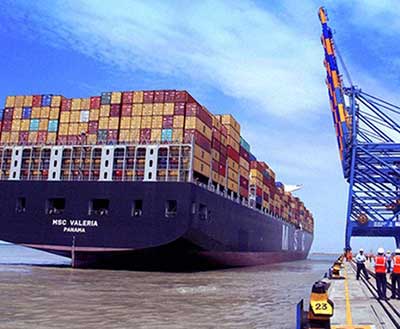Relevance: GS-2: Bilateral Agreements involving India and/or affecting India’s interests
Relevance: GS-3: Infrastructure: Ports; Inclusive Growth and issues arising from it
Key Phrases: FTP, DGFT,Local for Global and PLI,Transfer of Technology,China to invest $1.4 Tn on infrastructure (2019-23).
Context:
- The crisis due to COVID related lockdowns had a disproportionate impact on capital-starved MSMEs.
- Despite the revival of the global economy, new domestic challenges have emerged.
- With a call for a new Foreign Trade Policy (FTP) and new opportunities arising due to geopolitical and geoeconomic changes, policy decisions should be recalibrated to suit the needs of MSMEs.
What is FTP?
- Foreign Trade Policy is a set of guidelines and instructions
established by the DGFT in matters related to the import and export of
goods in India. The Government of India, Ministry of Commerce and Industry
announces Export-Import Policy every five years.
- DGFT is the Directorate General of Foreign Trade, which is an attached body to the Ministry of Commerce and Industry.
- India released its last FTP in 2015 and the new policy was expected to be released in 2020. Due to the COVID pandemic, the policy release got delayed. It is speculated that a new policy will be released soon.
Importance of FTP
- It sets out the regulations for cross-border trade.
- It also clears the government's position on various variables such as technology flow, intangibles, etc.
- This is essential to reveal the country’s position and alignment with
flagship programmes like
- Local for Global and PLI (Production linked incentive) schemes,
- WTO’s ruling against India’s export incentive schemes(EIS),
- An overdue review of the SEZ scheme,
- Changing geographical profiles of India’s export basket.
- Hence, it is essential to bring out the policy which ensures the interest of all the domestic stakeholders and irons out policy uncertainties.
Importance of MSMEs
- It is one of the biggest employers in the Indian economy
- 2nd biggest employer after agriculture - employs 12 crore workers.
- It contributes heavily towards export earnings.
- Forms 40% of India’s exports.
- This reduces the current account deficit and ensures sufficient foreign reserves to sustain oil imports.
- MSMEs are geographically distributed and are mostly present in tier 2,3
cities.
- It ensures inclusive growth.
- Forms the backbone of the Indian Economy
- Contributes 29% to India’s GDP.
Challenges Faced by MSMEs
- Inflation
- There’s a rise in the prices of raw materials such as steel and plastics.
- Shortage of intermediary goods and key ingredients
- There is a shortage of shipping containers and labour.
- The inability of MSMEs to utilise the increase in demand
- Due to the above reasons, they are not able to avail the opportunities arising from the revival in the economy.
Expectations from FTP
- Modifying the minimum cap for the net FEE
- As per the provisions of the Services Exports from India Scheme (SEIS), an incentive of 3-7% of net foreign exchange earnings (FEE) is provided to services exporters of notified services in India.
- With the suitable modifications, more MSMEs can be eligible for this scheme and it will further incentivise them to become economies of scale. This will counter the “MSME Dwarfism” as mentioned by the economic survey 2019.
- Faster GST refunds to global services will further incentivise MSME exporters.
- Extension of incentives granted to retail and wholesale traders under the ambit of the MSME category must be extended to exporters as well.
- Facilitating the Transfer of Technology and handholding to develop the
technological capabilities of MSMEs.
- This would help them to counter the global competition and increase self-reliance in the future.
- An extension in the rollout of the FTP would only make it difficult for MSMEs to leverage the new opportunities ahead of them.
Need For Infrastructure Upgrade
- To boost competitiveness
- India must invest in upgrading export infrastructure to stay
ahead of technology-advanced countries.
- Ports - Reducing turn around time (from current 3 days to global average of 1 day).
- Quality testing and certification centres.
- India must invest in upgrading export infrastructure to stay
ahead of technology-advanced countries.
- For instance, China has planned to spend $1.4 trillion on infrastructure between 2019 and 2023.
- India must adopt modern trade practices that can be implemented through
the digitisation of export processes.
- This will save both time and cost.
Conclusion:
- The government must-
- Help MSMEs plan to tap the export potential in existing tariff lines by further building on Trade Agreements with UAE and Australia.
- Provide policy support to raise the number of exporting MSMEs.
- Increase MSME exports by 50% in 2022-23.
- On the lines of achieving $419 Bn of exports (for the first time exports have surged to $400 Bn).
Source: The Hindu BL
Mains Question
Q) What is Foreign Trade Policy? How can it reduce the crises faced by MSMEs?








